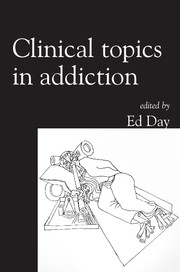Book contents
- Frontmatter
- Contents
- List of tables
- List of boxes
- List of figures
- List of contributors
- Foreword by Nat Wright
- Preface
- 1 What works in drug addiction?
- 2 The development of the drug treatment system in England
- 3 Stimulant use still going strong
- 4 Adverse effects of khat: a review
- 5 What the clinician needs to know about magic mushrooms
- 6 What works in alcohol use disorders?
- 7 Management of alcohol detoxification
- 8 Nicotine addiction and smoking cessation treatments
- 9 Pathological gambling: an overview of assessment and treatment
- 10 Use of investigations in the diagnosis and management of alcohol use disorders
- 11 Laboratory investigations for assessment and management of drug problems
- 12 Pharmacotherapy in dual diagnosis
- 13 Dual diagnosis: management within a psychosocial context
- 14 Treating depression complicated by substance misuse
- 15 Treating anxiety complicated by substance misuse
- 16 An overview of psychological interventions for addictive behaviours
- 17 Motivational interviewing
- 18 Substance misuse in adolescents
- 19 Management of drug misuse in pregnancy
- 20 Intoxication and legal defences
- 21 Substance misuse and violence: the scope and limitations of forensic psychiatry's role
- 22 Literary and biographical perspectives on substance use
- Index
6 - What works in alcohol use disorders?
Published online by Cambridge University Press: 02 January 2018
- Frontmatter
- Contents
- List of tables
- List of boxes
- List of figures
- List of contributors
- Foreword by Nat Wright
- Preface
- 1 What works in drug addiction?
- 2 The development of the drug treatment system in England
- 3 Stimulant use still going strong
- 4 Adverse effects of khat: a review
- 5 What the clinician needs to know about magic mushrooms
- 6 What works in alcohol use disorders?
- 7 Management of alcohol detoxification
- 8 Nicotine addiction and smoking cessation treatments
- 9 Pathological gambling: an overview of assessment and treatment
- 10 Use of investigations in the diagnosis and management of alcohol use disorders
- 11 Laboratory investigations for assessment and management of drug problems
- 12 Pharmacotherapy in dual diagnosis
- 13 Dual diagnosis: management within a psychosocial context
- 14 Treating depression complicated by substance misuse
- 15 Treating anxiety complicated by substance misuse
- 16 An overview of psychological interventions for addictive behaviours
- 17 Motivational interviewing
- 18 Substance misuse in adolescents
- 19 Management of drug misuse in pregnancy
- 20 Intoxication and legal defences
- 21 Substance misuse and violence: the scope and limitations of forensic psychiatry's role
- 22 Literary and biographical perspectives on substance use
- Index
Summary
Summary Treatment of alcohol use disorders typically involves a combination of pharmacotherapy and psychosocial interventions. About one-quarter of people with alcohol dependence (‘alcoholics’) who seek treatment remain abstinent for over 1 year. Research has consistently shown that less intensive, community treatment (particularly brief interventions) is just as effective as intense, residential treatment. Many psychosocial treatments are probably equally effective. Techniques for medically assisted detoxification are widespread and effective. More recent evidence provides some support for the use of drugs such as acamprosate to prevent relapse in the medium to long term.
There has been much recent debate and criticism of UK alcohol policy (Drummond, 2004; Hall, 2005). Over the past 20 years, per capita alcohol consumption in Britain has increased by 31%, leading to large increases in the prevalence of alcoholic cirrhosis, alcohol-related violence and heavy alcohol use. Alcohol misuse causes at least 22 000 premature deaths each year and costs the taxpayer an estimated £20 billion (Prime Minister's Strategy Unit, 2003). The key features of alcohol dependence and harmful use are listed in Box 6.1. About 5% of the UK population are dependent on alcohol (Farrell et al, 2001) and 8 million Britons drink more than recommended levels.
In their review of seven multicentre studies in the USA and Europe, involving over 8000 treatment-seeking individuals, Miller et al (2001) found that overall mortality at 1-year follow-up was about 1.5%. Clients reported an 87% reduction in alcohol consumption, with abstinence on 80% of days. Overall, 24% were abstinent for the entire year, and a similar proportion resumed controlled, problem-free drinking. These results were validated using confidants (often the client's spouse). Most relapses occurred within the first 3 months. These results are supported by other studies, including a more recent review of alcohol treatment from the Scottish Executive (Ludbrook et al, 2005). By contrast, Vaillant (1983) estimated that 2–3% of alcohol-dependent individuals in the USA abstain spontaneously each year in the community.
- Type
- Chapter
- Information
- Clinical Topics in Addiction , pp. 60 - 75Publisher: Royal College of PsychiatristsPrint publication year: 2007



